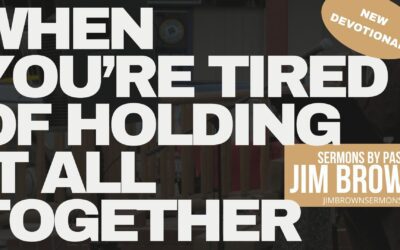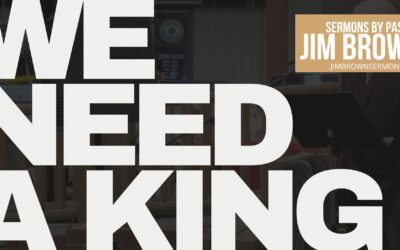MARCH 14, 2025
EP 16: WHAT ARE YOU DOIN’?! | Trusting God’s Plan Changes Everything
Joshua, Judges, Ruth
You ever look at your life and think, ‘What in the world is going on?!’ We make plans, we set goals—but then everything shifts. The good news? Trusting God’s plan changes everything. His faithfulness never fails, His promises are true, and in the end, His redemption brings the victory we could never achieve on our own.
Sermon Study Resources
Sermon Notes
Your Subtitle Goes Here
Sermon Notes: What Are You Doin’?! | Trusting God’s Plan Changes Everything
Main Scripture: Joshua, Judges, Ruth
📖 Key Verses: Joshua 1:8-9, Isaiah 32:17, Psalm 91:1-2, Joshua 10:13, Joshua 11:15, Joshua 24:14-15, Judges 10:13, Judges 21:25, Psalm 85:10, Genesis 15:16, Romans 10:9, John 3:16, Romans 5:8
Introduction: Seeing the Bigger Picture
- We’ve been doing an overview of the Old Testament—covering several books at once.
- Many people see a difference between the God of the Old Testament and the New Testament, but God’s faithfulness remains unchanging (Hebrews 13:8).
- This sermon explores how trusting God’s plan is the foundation of victory in Christ, and how redemption is at the heart of His story.
1. Trusting God’s Plan from the Beginning
- Faith has always been the key. Adam and Eve had to trust God’s command (Genesis 3).
- Abraham lived by faith even though he was raised in an idolatrous home (Genesis 15:16).
- From the beginning, people have had to trust God’s promises even when they couldn’t see the full picture.
- Joshua 1:8-9 (NLT) – “Study this Book of the Law continually. Meditate on it day and night so you will be sure to obey everything written in it. Only then will you prosper and succeed in all you do. This is my command—be strong and courageous! Do not be afraid or discouraged. For the Lord your God is with you wherever you go.”
📌 Key Takeaway: Living by faith means walking in obedience, even when we don’t understand everything.
2. The Power of Contrast: Victory vs. Failure
- Joshua vs. Judges: A stark contrast in trusting God’s plan
- Joshua: Fast-moving, full of victories—obedience leads to God’s righteousness and favor.
- Judges: Discouraging, filled with failures—disobedience leads to defeat.
- Joshua faced battles but trusted God’s faithfulness (Joshua 11:15).
- Judges 21:25 (NLT) – “In those days Israel had no king; all the people did whatever seemed right in their own eyes.”
- When people stop trusting God and start relying on their own wisdom, they spiral into spiritual darkness.
📌 Key Takeaway: Victory comes from trusting God. Defeat comes from rejecting Him.
3. Trusting God’s Plan Leads to Redemption
- Tony’s Testimony: Learning to surrender fully to God.
- Isaiah 32:17 (NIV) – “The fruit of that righteousness will be peace; its effect will be quietness and confidence forever.”
- Without righteousness, there is no peace.
- Many people try to control their own lives, but true peace comes from God’s promises and faithfulness.
- Psalm 91:1-2 (NLT) – “Those who live in the shelter of the Most High will find rest in the shadow of the Almighty.”
📌 Key Takeaway: Trusting God’s plan, rather than our own, brings true peace and redemption.
4. The Story of Ruth: A Picture of Redemption
- Ruth trusted God’s plan and was redeemed through Boaz—a foreshadowing of Jesus Christ, our redeemer.
- Ruth 1:16 – “Your people will be my people, and your God my God.”
- The kinsman-redeemer role points to Christ’s redemption (Ruth 4).
- Romans 10:9 (NLT) – “If you openly declare that Jesus is Lord and believe in your heart that God raised him from the dead, you will be saved.”
- John 3:16 (KJV) – “For God so loved the world, that he gave his only begotten Son, that whosoever believeth in him should not perish, but have everlasting life.”
📌 Key Takeaway: Jesus is our redeemer, and trusting Him changes everything.
5. Why God’s Promises Never Fail
- Joshua 24:14-15 (NLT) – “But as for me and my family, we will serve the Lord.”
- Judges 10:13 (NLT) – “Yet you have abandoned me and served other gods. So I will not rescue you anymore.”
- Psalm 85:10 (NLT) – “Unfailing love and truth have met together. Righteousness and peace have kissed!”
- Victory in Christ comes when we choose faith, obedience, and surrender.
📌 Key Takeaway: God’s faithfulness never changes, but we must choose to trust Him.
6. Final Challenge: What Are You Doin’?!
- Are you trying to do life your way, or are you trusting God’s plan?
- Are you still trying to fight your own battles, or are you walking in victory in Christ?
- Are you resting in redemption, or are you still struggling in self-reliance?
💬 Reflection Questions:
- What areas of your life are you struggling to trust God’s plan?
- Where do you need to experience redemption and victory?
- How can you live by God’s faithfulness instead of your own strength?
Romans 5:8 (KJV) – “But God commendeth his love toward us, in that, while we were yet sinners, Christ died for us.”
📌 Final Takeaway: Surrender fully to God. Trusting His plan changes everything.
How to Grow in Faith & Next Steps
✅ Pray daily for God’s guidance – Don’t just trust God for salvation, trust Him in your daily life.
✅ Read the Bible regularly – Study passages like Joshua, Judges, and Ruth to see how faith leads to victory.
✅ Surround yourself with believers – Join a Christian discipleship group to grow in faith and prayer.
✅ Listen to faith-building messages – Check out more Christian podcasts and sermons on faith on our website!
💡 Want more content on faith and redemption? Browse our Christian sermons online and learn more about trusting God in hard times.
Conclusion & Call to Action
- What Are You Doin’?! – Are you walking in faith or fear?
- Choose to trust God’s plan, embrace redemption, and live in victory in Christ.
Bible Verses
Your Subtitle Goes Here
Bible Verses
Joshua 1:8-9 (NLT)
“Study this Book of the Law continually. Meditate on it day and night so you will be sure to obey everything written in it. Only then will you prosper and succeed in all you do. This is my command—be strong and courageous! Do not be afraid or discouraged. For the Lord your God is with you wherever you go.”
Isaiah 32:17 (NIV)
“The fruit of that righteousness will be peace; its effect will be quietness and confidence forever.”
Psalm 91:1-2 (NLT)
“Those who live in the shelter of the Most High will find rest in the shadow of the Almighty. This I declare about the Lord: He alone is my refuge, my place of safety; he is my God, and I trust him.”
Joshua 10:13 (NLT)
“So the sun stood still and the moon stayed in place until the nation of Israel had defeated its enemies. Is this event not recorded in The Book of Jashar? The sun stayed in the middle of the sky, and it did not set as on a normal day.”
Joshua 11:15 (NLT)
“As the Lord had commanded his servant Moses, so Moses commanded Joshua, and Joshua did as he was told, carefully obeying all of the commands that the Lord had given to Moses.”
Joshua 24:14-15 (NLT)
“So fear the Lord and serve him wholeheartedly. Put away forever the idols your ancestors worshiped when they lived beyond the Euphrates River and in Egypt. Serve the Lord alone. But if you refuse to serve the Lord, then choose today whom you will serve. Would you prefer the gods your ancestors served beyond the Euphrates? Or will it be the gods of the Amorites, in whose land you now live? But as for me and my family, we will serve the Lord.”
Judges 10:13 (NLT)
“Yet you have abandoned me and served other gods. So I will not rescue you anymore.”
Judges 2:16-19 (NLT)
“Then the Lord raised up judges to rescue the Israelites from their attackers. Yet Israel did not listen to the judges but prostituted themselves by worshiping other gods. How quickly they turned away from the path of their ancestors, who had walked in obedience to the Lord’s commands. Whenever the Lord raised up a judge over Israel, he was with that judge and rescued the people from their enemies throughout the judge’s lifetime. For the Lord took pity on his people, who were burdened by oppression and suffering. But when the judge died, the people returned to their corrupt ways, behaving worse than those who had lived before them. They went after other gods, serving and worshiping them. And they refused to give up their evil practices and stubborn ways.”
Judges 21:25 (NLT)
“In those days Israel had no king; all the people did whatever seemed right in their own eyes.”
Psalm 85:10 (NLT)
“Unfailing love and truth have met together. Righteousness and peace have kissed!”
Genesis 15:16 (NLT)
“After four generations your descendants will return here to this land, for the sins of the Amorites do not yet warrant their destruction.”
Romans 10:9 (NLT)
“If you openly declare that Jesus is Lord and believe in your heart that God raised him from the dead, you will be saved.”
John 3:16 (KJV)
“For God so loved the world, that he gave his only begotten Son, that whosoever believeth in him should not perish, but have everlasting life.”
Romans 5:8 (KJV)
“But God commendeth his love toward us, in that, while we were yet sinners, Christ died for us.”
Sermon Slides
Your Subtitle Goes Here



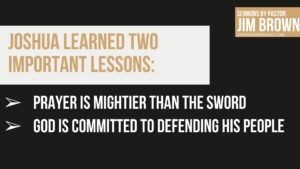
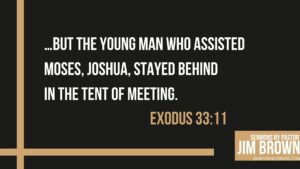

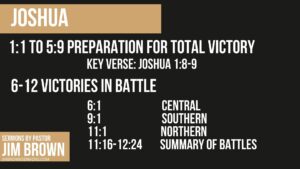
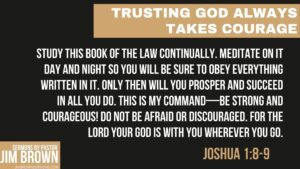



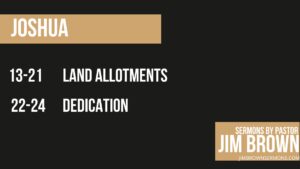

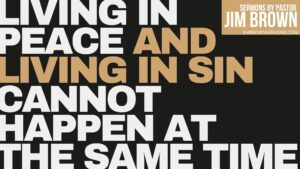



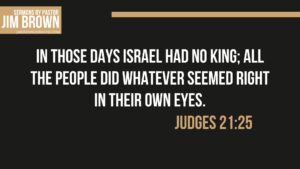
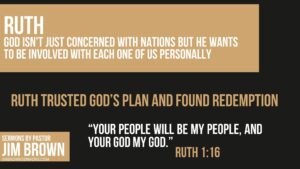



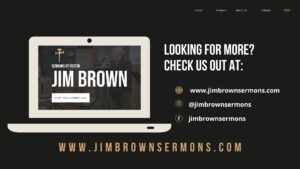
Related Song List
Your Subtitle Goes Here
Recommended Resources
Your Subtitle Goes Here
Recommended Books
- “The Normal Christian Life” by Watchman Nee
Nee explores foundational Christian principles, focusing on living by faith and experiencing victory through Christ.
View on Amazon - “The Sin of Certainty” by Peter Enns
Enns discusses the importance of trusting God over holding rigid beliefs, encouraging a faith that embraces uncertainty and relies on God’s faithfulness.
View on Amazon - “The Promise: God’s Purpose and Plan for When Life Hurts” by Jonathan Morris
Morris addresses understanding and trusting God’s plan amid suffering, aligning with the sermon’s themes of faith during challenging times.
View on Amazon - “Don’t Waste Your Life” by John Piper
Piper challenges readers to live a life of purpose and significance, urging them to pursue a life that glorifies God and impacts eternity.
View on Amazon - “Walking with God” by John Eldredge
Eldredge teaches Christians what it means to live in intimate relationship with God, sharing personal experiences to illustrate a life of conversational intimacy with Him.
View on Amazon - “Freedom in Christ” by Neil Anderson
Anderson teaches believers how to experience true freedom and victory by understanding their identity in Christ and trusting God’s truth. This aligns perfectly with the sermon’s themes of trusting God’s plan, redemption, and living in victory.
View on Amazon - “The Purpose Driven Life” by Rick Warren
This best-selling book guides readers on a 40-day spiritual journey, emphasizing living out God’s purposes with faith and obedience.
View on Amazon
Videos and Sermons
- “Trusting God When You Don’t Understand” by Life.Church
This sermon discusses how to rely on God’s plan during challenging circumstances, reinforcing themes from the sermon.
Watch Video - “The Book of Ruth” – Bible Project Video
This animated overview of the Book of Ruth highlights themes of loyalty, faith, and God’s redemptive plan, complementing the sermon’s focus on Ruth’s story.
Watch Video - “Trusting God’s Plan | Steven Furtick”
Pastor Steven Furtick explores how to trust God’s plan, even when it doesn’t align with our expectations, aligning with the sermon’s message of living by faith.
Watch Video
Devotionals and Study Guides
- “The Purpose Driven Life: What on Earth Am I Here For?” Study Guide
A companion to Rick Warren’s book, this study guide offers daily reflections and questions to deepen understanding of living out God’s purposes.
View on Amazon - “Trusting God Day by Day: 365 Daily Devotions” by Joyce Meyer
This devotional provides daily readings focused on building trust in God’s plan and growing in faith.
View on Amazon
Some of these above links in this post maybe affiliate links, and we may earn a small commission at no additional cost to you. These are resources that we would recommend regardless of whether we earn a commission or not. The income generated helps cover website maintenance costs, allowing us to continue sharing sermons, resources, and content with you. We appreciate your support!
Sermon Transcript
Your Subtitle Goes Here
Transcript: What Are You Doin’?! | Trusting God’s Plan Changes Everything
We’ve been doing an overview of the Old Testament. Now, some people, I mean this has just been flying, I mean two or three books a day. As we do this, it’s like, whoa, there’s a lot we’re missing. And that’s the idea right now. What we want to do is we want to miss the details and we want to see what is God doing overall. Because it’s been a burden of mine that some people have seen this God of the Old Testament and the God of the New Testament. It’s all one God. And so I want to be able to see how God has been the same yesterday, today, forever. He’s the same God. He’ll always be the same. He always was the same. And so that’s why we’re not getting too bogged down with the specifics, but we are seeing how Adam and Eve lived by faith.
They trusted God. He said not to eat from a certain tree, and they didn’t eat from it by faith. They didn’t know what the results really would be. They didn’t understand death. Abraham was raised in an idolatrous home and all he had was a faint knowledge of God, but he wanted to know that God and by faith he followed God and on through the Bible, everybody lived by faith and God responded to everybody according to faith. And so we’ll be doing more reviews and touching on some of those again in weeks ahead. But one thing that’s helpful for us to understand how to look at different things is by contrast. Sometimes the best way to appreciate something is to see a contrast to it. Think about a painting. We had one of those painting parties where people, a lady comes and shows you a bunch of different paintings and you kind pick ones you like and then she starts putting different frames on it and you say, whoa, man, that really looks different just by the frame.
And then you take it into your room, which is painted a different color, and it’s like, whoa, this doesn’t seem the same at all. Because there’s different things, different contrasts that are brought out depending on colors. It’s also helpful in our relationships to recognize and understand how contrast works. It can work for you or it can work against you, can’t it? In a relationship. There’s the old adage that opposites attract, and then there’s the new modern version, opposites attack. But really there’s a balance there and there’s contrast and it’s a good thing to bring contrast in. It helps keep our lives on track. Oftentimes looking at good versus bad. Sometimes when we have a decision to make, we start making a list, all the pros and all the cons and to kind of contrast, show the contrast in terms of trying to make a good decision. Well, each one of us have been there. We’ve all had to deal with the contrasts in our life. I’m going to ask Tony to come up here. I did warn him ahead of time how ready he is. I don’t know, but Tony Tini is going to join us and tell us a little bit about some of the contrasts he’s seen in his life. You’ve been out here how long Tony? It’s a year.
In fact, it was the soup and pie fundraiser I think was my first church service.
Okay, welcome. This is of
Celebration for you today. I’m not sure what I’m going to talk about. Well, I can’t call my thoughts enough to make it make sense. And when Raylin first brought this up to me, I said, yeah, I’ll go up there someday. And that was a week ago, and I kind of got out of the conversation and Jim asked a few days later, I don’t feel ready. I don’t feel ready right now. And he mentioned that that’s, in fact, I told him to stay up here with me because I said, I’m still in the middle of this stuff I’m going through. It’s not time to, but he said, no, I want you to talk about the progress so far. And so I’ll start with just saying I went to Jim and Raylen a year ago, me and my wife for marriage counseling, a lot of stress in the marriage of course. And Jim and Raylen, very different from other marriage counselors. What’s your relationship with God? And I kept saying, well, that was okay. That part’s okay. My marriage is all screwed up though.
But I knew he was telling me the truth and I knew he was sincere and I knew he wanted to help. And so we kept going. The poor guy gave me his home phone number and I was on the phone with him one day and I had a problem with anger. Nice. Well, more rage I think. And he’s telling me, your relationship with God is not right. And I’m trying to tell him it is. And he’s saying, well, is your relationship okay when you’re losing your temper and you’re yelling and stuff? Okay, you got a point there. So I was reluctantly starting to study identity in Christ and going over it and looking at the Neil Anderson material.
I was listening to a tape in the car one day and was about righteousness. And all of a sudden stuff I’ve heard so many times just kind of went from my head to my heart and it clicked the righteousness of God through Jesus Christ. It’s like, okay. So I started studying righteousness and I started getting a little excited about it and I started to realize that everything has to start there. I wasn’t, I was trying to add everything onto there. Why am I not happy? And I was really confused because I was really putting a lot of effort into getting happy and trying to make life work for me and felt I was doing the right thing. And as I studied the word righteousness, it’s all about identity and everything like that. And started to be clear to me that how important that was, and I’m going to ask you to hold this for a second. I brought this up here. I figured I wouldn’t think of what to say. Is that your file cabinet? Well, hey, it took me a while to switch to NIV too.
I got to clean this out. I know it was real interesting to come across this scripture, quite frankly as it was happening to me because I really started to feel some calmness and everything was going to be okay, some trust. And I realized that I think all along I trusted God with my salvation, but I was going to handle my marriage. I was going to handle my financial situation. I was going to handle everything else because through this process and this process was so, so difficult. I wasn’t having any fun at church. The reason I didn’t get to know a lot of you, because as soon as the pastor said, go and be the church, I hit the door. And I should say my wife ended up leaving and ended up filing for divorce. And the pastor was up here with the ladders a while back, and I had my ladder totally, not 90%, totally on my wife and her opinion of me and her approval.
And that’s where the significance of security, it was in the wrong spot. It really was. When she moved, I fell. Those of you that have gone through depression, wow, it was large. It was huge. It was enveloping. I didn’t go out of the house except to come to church and go grocery shopping, and I was able to control myself in church, but there were times where I had to put sunglasses on inside the grocery store. I would start crying just for whatever reason. So it was a tough time. And so talking with Jim, going through scripture, the men’s group on Saturday couldn’t have been more helpful and still is, and going to church on Sunday and just getting through the hard part and then going to study some of the stuff that Jim was talking to me about. And like I said, I came across this as it was happening in Isaiah, okay, the fruit of righteousness will be peace.
The effect of righteousness will be quietness and confidence forever. My people will live in peaceful dwelling places, in secure homes, in undisturbed places of rest. That’s what happened folks. And I heard people around this church talking about the peace of God, the rest of God, and I’m going, I don’t know what they got, but I want it. And my circumstances have not changed. My circumstances are still pretty bad as far as the situation I described to you, but the peace of God is true like Philippians that surpasses all understanding. I mean, I’m like, wow, no kidding. Because if you go by my circumstances, I should still be in a lot of trouble. And at first I thought, well, maybe it’s just because some time has passed. That’s not it at all. I’m convinced I’ve thought about that. It’s not it. It’s because I started to trust God.
And one of the shifts in my mind that took place not too terribly long ago was, and I think you can apply this to any circumstance, was because at first it was just she has to come back. I’m not going to be happy unless she comes back, never going to be happy unless she comes back. All this. And I’m praying like that. I’m praying with all this circumstance. God, if you have all that motive behind it, and finally it got to, am I going to trust God no matter what? Amen. And I’ll leave it right there.
Thank you. Okay, thanks. Let me pray. Oh, heavenly Father, we thank you for the righteousness that you’ve imputed to us. And Lord, we don’t want to just take a 50 cent word there and try to gloss over the fact that we have no righteousness of our own. But Lord, you’ve given it to us as we follow you. And as Tony said, there is no peace apart from righteousness. There’s no peace apart from you. There’s no peace in doing things our way. And I thank you for Tony. I pray that you would strengthen Tony in his walk with you and his relationship with others, and especially with his relationship with Kathleen. And Lord, we pray that from the depths of your love that you had reached down to her, bring others into her life that will lead her to Jesus. We thank you for the very simplicity of the gospel. Lord, trust Jesus for salvation and for all things. Pray that this time together, Lord will be time of understanding that great love even deeper in Jesus’ name. Amen.
Okay, classist. So as I said, we’re taking this overview of the Bible and I’m following an outline that’s from a professor down at Malton, Noma named Albert Bayless. And it helps to follow an outline like that because it keeps you on track and keeps you accountable to moving. Otherwise I could get really bogged down. And so I wanted to commit to that because I wanted to see this overview happen and not get too bogged down in details at this point. Maybe we’ll do that again some other time. But in looking at what was put together for this time, it was Joshua, judges and Ruth and I said, oh, Jim, what are you doing?
Joshua, judges and Ruth, how do you reconcile these? And that’s where the idea of contrast comes in is, boy, you talk about contrast, Joshua and judges can’t be more different while they’re right next to each other there in the Bible, they’re right there next to each other. Historically, Joshua is fast moving and it’s full of victories one right after another. Judges is discouraging. It’s depressing. Joshua faces extreme difficulties and works right through ’em. Judges encounters difficulties and compounds them. Have you ever been there? And then there’s Ruth. Where does that fit in? That’s sort of God’s personal touch in the midst of some very hard times. God shows that he’s a God of love, a God of provision for our very deep needs. It’s not just a book that is thrown in there for no reason. I think it really does, again, take the contrast of God’s great love, his great provision and our great need, and it brings them together.
So we’ll start with Joshua, and this is going to be a little bit historical for a bit here to help you see who Joshua is because we kind of flew by his life in Exodus 40 years prior to this time that Joshua was written. He was like a lot of the guys he hung out with. He was a slave. He was a slave in Egypt after deliverance of God’s people through the Red Sea. He was there in the desert. What happened there is that they met an army right away. They met opposition. Soon as they got there, Joshua led in the battle and he learned something very early at that time that the battle belonged to the Lord. And you remember he only won that battle because of Moses’ arms up in the air. Joshua learned two important lessons. That first prayer is mightier than the sword.
And second that God is committed to defending his people. Then Joshua’s later chosen to go partway up the mountain of the Lord with Moses, and he waited there for 40 days. I think for Joshua, that was probably a spiritual retreat, just waiting. And the next time we see him is at a worship service in Exodus 33. And it says, inside the 10 meeting, the Lord would speak to Moses face to face just as a man speaks to his friend. And then afterwards Moses would return to the camp. But it says, the young man who assisted him, Joshua, you should stay behind in the tent. He just want to linger back there and soak you all in as much as he could. So that’s kind of who this Joshua Guy is in Psalm 91 is said to be written about him. And in verses one and two, it says, those who live in the shelter of the most high will find rest in the shadow of the Almighty.
This I declare of the Lord. He alone is my refuge, my place of safety. So there’s again, a snapshot of who this Joshua Guy is. It’s not really what you would think of in terms of training for somebody who’s going to be a world-class military leader, is it, and think, well boy, what kind of training do they do? And all this. And here, Joshua’s getting ready to go into battles and his primary background is his relationship with God. What’s that old movie, Francis that the army movie that we, Sergeant York, Sergeant York. Did anybody know the history of this guy? Yeah, he was somebody back in World War I who he had a deep relationship with. God didn’t even want to go to war because of his relationship with God, but he believed by faith that he should go. And God gave him wonderful victories as he meditated on God’s word and followed God’s word.
And so it is, we have to realize that especially a day like today, God really is involved in every aspect of our country and what goes on. And even in terms of the wars and things that go on that we can’t leave God aside and say that he’s not there, that he doesn’t have some involvement. He doesn’t know what’s going on or doesn’t care He does. And Joshua being a great man of faith was a man that was called to go to war. Next time we see him in Exodus, he’s going to spy out the land. And 12 spies came back and 10 of them had a bad report. Only he and Caleb had a good report. So God says, okay, you guys are going to be wandering in the desert for 40 years because you don’t trust me, but Joshua and Caleb get to go into the promised land after the 40 years are up.
Then as Moses gives the charge in Deuteronomy to the next generation to take over to move into the promised land, he commissions Joshua to go with them. And there are four main parts to the book of Joshua. That’s where we’re picking up now. And that is that there’s a preparation for total victory in the first five chapters. And then there’s a portion from chapter six through 12 that it’s the victories in the battles. And then 13 through 21, he allots the land to the different tribes. And then verses 22 through the end is a dedication service. And so in chapters one through five, nine, it’s a preparation for total victory. And listen to this preparation for victory. It’s the key verses found in Joshua one, eight and nine. Study this book of the law, continually meditate on it day and night so that you may be sure to obey all that is written in it.
Only then you will succeed. Okay? Only then will they have success. I command you. This is a command. Be strong and courageous. Okay? It’s going to take some courage. It’s going to take trusting God and trusting God is always going to take some courage. Don’t be afraid or discouraged for the Lord. Your God is with you wherever you go. So this time Joshua sends some spies into the land. This time he’s not saying, don’t give me your opinion about this. Just come back and report what you see. Okay? Because we’re going in there. We just want to know what we’re going into. And this is where the story of Rahab fits in and how she and her family were spared because of her faith in God. And then Joshua in chapter five, verse 13, gets to meet the true commander of the army. Joshua approaches the city of Jericho, and he looks up and he saw a man facing him with a sword in his hand.
And Joshua went up and said, are you friend or full? And he says, neither one. I am the commander of the Lord’s army. And Joshua falls on his face and says, I’m at your command. Whatever you want me to do, I’ll do. And he says, take off your shoes. You’re on holy ground. It’s a sign of submission. Submit to the Lord and allow him to fight your battles for you. The next portion is victories and battle. We see a lot of victories of chapter six through 12, and if there’s two words that could sum up this, it’s total victory, just total victory. The book contains 31 kings that Joshua conquered, and it demonstrated how God was mighty and saw him through each portion for total victory. His military strategy was broken down into three parts. He hit the central first and then the southern and then the northern, and then verses 11 through 12 are summaries of those battles. That’s how it’s written up there for chapter six through 12. The central battle is victory through faith. It’s probably the most unusual battle plan, most unique way to conquer a city state that you’ll ever run across. This is where they were to march around for seven days and on the final day, blow their trumpets and shout. What note did they blow under trumpets for the walls to come down be flat?
Well, what else would it be? So I would have no problem with that one’s. I even know what I have in my repertoire of singing. So here they are, the walls fall down, they blow their horns, but there is some defeat here. There’s victory through faith because they had to have a lot of faith to blow their horns and have the walls fall down and believe that God was somehow going to work. They didn’t know the walls would fall down or what was going to happen exactly, but they believed God that this is what he was leading them to do. And then there’s a defeat, but it’s through sin. There are two clear cases of disobedience that the book of Joshua shows that God does not compromise. First is the sin of a. In chapter seven, he took some of the goods from Jericho, some of the spoils that God commanded them not to keep for themselves.
Joshua was devastated because they lost 36 men in the following war against this little town called ai. There’s no other mention of casualties throughout the rest of the book. Did you know that all? There’s listed as 36 and this devastated Joshua. The other time that they had a defeat was one of the city states had lied to them. They sent some people to talk to ’em and said, well, hey, we’re from a distant land, but we want to have peace with you. And they showed some bread and different things to show how moldy it was and that they’ve been traveling a long time. And so the leaders of Israel inspected the bread and believed them. But it says in Joshua nine 14, so the Israel leaders did not consult the Lord. See, if they had prayed, God would’ve shown them the true nature of the situation.
So it is with us. A lot of times we consult the Bible and that’s a good thing to do. We always should, but we also need to consult the Lord in prayer and go to him with every situation for him to shed his light on it. So God brings about restoration from those two incidents. The sin is not allowed to continue. They repent of it. They do something with it right away, and God brings restoration. So with the central campaign successful in chapter eight, it says, Joshua, read to them. This is Joshua 8 34. Joshua read to them all the blessings and curses that Moses had written in the book of the law. He just wanted to bring them back to the Father, bring them back to God and say, remember now we need to stick with God. We need to walk with him to continue.
Then they go into the Southern campaign, chapters nine and 10. One of the highlights of this is Joshua’s running out of daylight, and he prays that God would keep it light longer so he can finish the battle. And in Joshua 10 13 it says, so the sun and the moon stood still until the Israelites had defeated their enemies. Just a little side note, there are reports from ancient writings all over the world that talk about one day that was kind of screwed up. In fact, one of the Mexican writings, their quote is, there was a night that did not end for a very long time. And so there’s writings from China and all over from these old ancient writings that say that there was this longer day for some reason or this longer night, there was one that said that the sun came up right at sunrise and just sat there for a long time, one of the different ancient writings from another country.
So it just shows that God truly did work a miracle. Then there’s the northern campaign. After seeing what happened in the south, the north really got together all the cities, all the states, everybody gathered together, everybody they could. And in Joshua 11, four, it says, all these kings responded by mobilizing their warriors and uniting their fight against Israel. It says that all their armies and array of horses and chariots covered the landscape like sand on a seashore, an incredible amount of opposition. Joshua led his army in a surprise, ambush and defeated them all. Then chapters 11 and 12 is a summary. It kind of just tells all about what had taken place, all who was defeated, and then the highlight for that, the key verse is Joshua 1115, it says, as the Lord has commanded his servant Moses. So Moses commanded Joshua, and Joshua did as he was told, carefully obeying all the Lord’s instructions to Moses.
See, Tony brought up an interesting point that without righteousness, without God’s righteousness, without falling under his umbrella of righteousness and living his way, there is no peace. Joshua really had peace. He had the peace of God. He knew that he can go into battle. That life is going to have opposition, it’s going to have temptations. But if you are bent on doing things God’s way and following him, you’ll have the peace of God. That doesn’t mean you will have perfection. It doesn’t mean you won’t struggle, but it means that you will have victory when you turn to him. And even when we mess up like happened in Joshua’s military, when we repent, God restores. So then why is Joshua told to exercise total destruction? That’s a question that often comes up. Is it because God is playing favorites and he doesn’t want to share the land with anybody?
This whole thing about total destruction back in Genesis when God made the original promise to the people of Israel in Genesis 1516, it says, God told Abraham that he couldn’t move into Canaan because the inhabitants had not yet reached a full level of depravity. He was giving them a chance to repent, and he gave them 420 years to repent, and all they did is get worse and worse and worse. And so God was judging them through Joshua in these defeats. Also, there are times, and we can’t say that every time a nation is defeated, that it’s a judgment from God because we know that there are oppressors, such as the people of Canaan who oppressed others who took advantage of them, but God will eventually deliver. So it’s a judgment from God due to their total depravity and their immorality. And he knew that their immorality would influence Israel also.
So they needed to be completely taken out of the picture, completely taken out so that they would not infect the people of God. See, God’s not partial though, because when Israel went and God immoral and far from, God started getting into idolatry and so on, he did the same thing with them. They lost their right to the promised land, so he wasn’t showing partiality. He said, same applies for you guys as applies to your enemies. You need to be following me. And in chapters 13, he divvies out the land among the tribes. The only 11 tribes get land. The 12th tribe, the Levites don’t get land. They’re the priests and they’re to live. The priests are to live among all the people and not be separated out. And then 22 through 24 is a dedication. And in Joshua 24, this is a common verse. A lot of us hear it over and over again, Joshua 24, 14, and 15.
So honor the Lord and serve him wholeheartedly. Put away forever the idols your ancestors worshiped when they lived beyond eu, Freddy’s River, and in Egypt. Serve the Lord alone. But if you are unwilling to serve the Lord, then choose today who you will serve. You see, he’s giving them an opportunity. Hey, if you don’t want to follow me, don’t follow me, but get out of camp, alright? Because don’t call yourself a Christian basically and not live like one, not believe, like one, not trust God. He’s saying, you have a chance now, but as for me and my house, we will serve the Lord. So now’s your chance. Book of judges. We move into that and say, okay, look, these people have had it all set up for ’em. The victories have been won, the land has been taken over. They’ve seen God work in miraculous ways.
They should have no problem keeping the ball rolling, right? Well, living in peace and living in sin cannot happen at the same time. Psalm 85, in verse 10 says that peace loves righteousness. The Book of Judges gets its name from the 11 men and one woman who served God during that time, and each one progressively got worse. In fact, really the only heroes in this whole book are the women and the men continually got farther and farther away from God. So you would expect that these people that were raised by God with an obvious demonstration of God’s power and direction to raise to this high level of faith. But faith isn’t something that we can give to the next generation. They’ve got to learn it for themselves. But we can set up that atmosphere for it to happen and we can tell the great stories of the great God and we ourselves can live a life of faith in that wonderful great God to demonstrate this should be an area of great progress for him.
But it’s one of repeated failure in judges. There’s sort of a key verse there, which is two 16 through 19, the Lord raised up judges to rescue the Israelites from their enemies. I might say, well, wait a minute. I thought all the enemies were gone. Well, God always left a remnant. And what it was is he told Joshua, as much as it’s up to you, get rid of everybody. But that doesn’t mean God gave him the opportunity to get ahold of every last enemy. And so he left a remnant there. Why? Because that remnant was there to tempt the people of Israel in order to test them to see if they were going to be true to God, and then to see if they would follow through with destroying the enemies. And so that’s where they fell apart art. So Israel didn’t listen to the judges, but instead they prostituted themselves to other gods, bowing down to them for the Lord took pity on them, says later on, he took pity on them who are burdened by oppression and suffering.
But when the judge died, people would return to their corrupt ways, behaving worse than they did before. They just had this spiraling down. There’s a cycle of events that’s laid out in judges that’s repeated many times throughout the 300 years that that book covers. First one is that loving and serving God. That’s where they started out. So loving and serving God. Then they turn to some evil deeds. And at this point, this is where Joshua was, he could have repented, they could have done something about it. They could have immediately turned back to God and said, God, we’ve done evil in your sight. But instead they forsook God and in forsaken God, they keep getting farther and farther away. Well, you know what they’re doing there? They’re justifying their sin. That’s what they’re doing. They’re saying, well, everybody else is doing it, or Does it really matter that much?
God will forgive me. Anyway, those types of lies is what takes them further and further from God. In judges 10 13, it says, you have abandoned me and served other gods, so I will not rescue you anymore. And then they followed their own pleasures. They just kept on going their own way. Next thing you know, there’s oppression, there’s war, there’s slavery, there’s famine, there’s depression. You see, God will not be mocked, right? What’s it say? You’ll reap what you sow. So these people thought they could sow unrighteousness, that they could sow sin, they could do what they wanted to do and eventually get away with it. And God’s saying, you will never get away with it. You will reap what you sow. And the result is oppression, war, slavery, famine, depression. Then they’d cry out to God in their distress and say, God, why is this happening to me?
What’s going on? Well, finally, the light bulb’s coming on and they’re including God again at some point, and then they’d repent. They’d turn from it. Then God would raise up judges to deliver them that it was more or less a judgment against the nation or whoever it was that was oppressing them. And then they’d be delivered and they’d be restored. And you can find this cycle just spiraling right through the Bible. And it’s still in effect today, over and over again, we can experience this. Judges has a verse that summarizes the whole thing in judges 21, 25. In those days, Israel had no king. Actually they did. God was their king, but they wouldn’t recognize a theocracy. So the people did whatever seemed right in their own eyes. History repeats itself. See, the possession of the promised land represents the Christian life.
It wasn’t like they were dying and going to heaven when they moved to that land. No. It was like we live today. The same thing. They had to live in the promised land by faith, not love the land, but love God. Show their faith in God, trust God in every situation. And then they would experience blessing. They would have trials. There were still enemies in the land. There were still wars to fight, but if they continued to walk with God and to trust him, well then they would’ve victory. Same thing in a Christian life. A yielded life is what God’s looking for. He’s looking for us to yield to him. And then we move into the Book of Ruth, which kind of brings these thoughts together. It’s a short book. It’s only four quick chapters. It says, God’s not only involved with the affairs of the nations, but he’s very, very involved with individuals, with each person.
He wants to be involved in our lives. He’s not just looking at the global picture all the time of what the nations are doing and raising up leaders. He’s saying, what’s going on with you? What’s going on in your life? What’s going on in your heart? That’s what Ruth is about. Ruth seems to bring some contrasts into harmony. It’s an important book because it also shows how Jesus is tied into the whole picture in terms of the genealogies. For those of you who like to study genealogies, this is where it ties it together that Jesus comes from the tribe of Judah just like it was predicted and that he’s related to King David. It’s a love story and as a love story. It’s sort of a mirror that reflects God’s love for you and for me.
In chapter one, I’m going to break it down into some chapters because it’s a very natural flow. It’s about a man who left his country and left Bethlehem because there was a great famine. He took his wife and their two little kids with him. Kids’ names were translated, sickly and puny. Okay, so here’s Naomi with her husband and their two kids, sickly and puny, and they go to Moab because there’s a famine in the land. And here this famine was probably a judgment of some sort. And rather than face the judgment, they’re running from it. And about 10 years into this, the father dies. The sons die, and she’s left there with two daughter-in-laws to take care of. And so they’re living there in the land of Moab, sort of destitute, and she hears that back in Bethlehem, things are going good again. The famine’s over God is blessing the people again.
So she determines to go back and she says to her daughters-in-law, let’s go back. Let’s go to the people there. Things are good. And so they decide to go back and on the way she says, for you two, you’re going to be strangers there. You’re not going to fit. In fact, the people of Israel really don’t like Moabites all that well. So there’s going to be some oppression there. You’re better off staying here with your mothers and have them take care of you and find some husbands here because you’ll never find a husband back in Israel. Nobody will want you. Nobody will take care of you. And they said, no, we want to go with, well, finally, she pushed the issue and one of the daughter-in-law said, okay, I’m going to stay here with mom and stay here with my gods. But Ruth said, no, I’m going to go with you. I want to be with you. She says, okay, well you can go with. She says, well, okay. I want your God to be my God. I want your people to be my people.
They’re convinced that no matter what, you’re going to stick with God. See, when she said that, she’s saying, I’m accepting the risk of poverty. T I’m accepting the fact that I’m going to be an outcast. Are you willing to be an outcast for Christ? I’m accepting the fact that I’ll remain single all my life. That’s okay, because you know what? I know the true God now and I want to be with him. I want to follow him, and I want to be with his people. You see, there’s a fact here that remains today that you cannot be following God and not be associated with his people and be a part of his people. And that’s what she’s saying. I want to identify myself with the Almighty God by identifying with his people and trusting him to meet our needs. So there was an element of faith that Ruth was exhibiting in the Almighty God.
So they moved back there and things are rough. And she says to her mother-in-law, Naomi, she says, let me go into the fields and do some gleaning. Lemme get some of the leftover food that the harvesters leave behind. Naomi says, yeah, go ahead, but be careful. Things are rough out there. So she goes and does some gleaning and found herself working in a field by, it was owned by a man named Boaz. And Boaz turned out to be a relative of the deceased father-in-law. Or actually it was probably a cousin of Ruth’s deceased husband. So she was there, and Boaz comes on the scene while she’s gleaning. And I like this what he says to the harvesters when he comes up, he says, the Lord be with you. And they say, the Lord bless you. Now is that union negotiations that you hear these days that the boss comes up and says, God bless you all.
And they say, oh, bless you too. Well boy has asked for me. He said, who’s this lady out here? This girl over there that’s doing the gleaning? And the foreman said, oh, she’s that young woman that came with Naomi from Moa Boy says, okay, well lunchtime comes. He takes her out to lunch and gives her enough food to take a doggy bag home and goes and tells her mother-in-law about this man that she met in the field. And she said, the man I worked for today, his name was Boaz. And mother-in-law says, praise the Lord. Or Lord bless him. That’s one of our kinsman redeemers. That man is related to your deceased husband and my deceased husband, and he’s one of our closest family. Then Naomi says, at times, come that I think you need to find a permanent home. Why don’t you go and approach this Boaz guy?
You see, they had a thing going on in those days according to the law that if a husband dies without leaving an heir, the woman, the widow could claim his brother or another relative and say, you need to marry me in order to carry on the family name to protect the family property and so on. So she could make this claim on him and she could take him to court in order to do that. Well, Naomi’s saying, well, we’re not going to take him to court, but what I want you to do, I really think he’s got his eye on you. And he’d go for this. And Ruth is kind of trusting here. It’s again, a faith issue for her. She’s saying now they’re going to be threshing grain. And when they thresh grain, they get together and they on this threshing floor and they do all the grain and it’s piled high.
And then when it’s all done, they have a party. Everybody eats and drinks and has a good time, and then they all go to sleep right there around this big pile of grain. All the different people doing the threshing, sort of like they’re sticking out like spokes in order to protect it basically. And so to protect their share. And so Naomi says to Ruth, you go there and lie down at his feet, show some submission here, and then when he asks you what you doing, you tell him that you want him to be your redeemer. So she goes there does his, Naomi says, as he falls asleep after he falls asleep, she lays down at his feet, he wakes up around midnight and he startled. He says, well, who are you? And she says, well, you cover me to your cloak. And he says, well, what’s going on?
She says, well, you are the only family member that can redeem me. Will you do it? And he says, praise the Lord, because he’s been waiting, alright. He’s been waiting for this time, but he couldn’t make the first move. Interesting. He had to wait for her to make the first move. He was already qualified to do it. He was willing he, he had the resources to be her kinsman redeemer. He says, there’s one problem. There actually is one person that’s closer to you than I am. Don’t worry about it. I’m going to take care of everything from here. You made the first move and from this point on, I’m going to take care of the rest. So he goes and sits there at the temple gate and says, okay, meets up with the other redeemer and says, this is the situation. She needs some redemption and so does the property.
And the guy says, okay, well I can’t do that because I’ve already got a family. I’ve already got an inheritance. It’s going to risk all that you see. So he goes back and he is able now to redeem her. As we look at that story, we have to realize that there’s a lot of similarities here. The whole idea of this kinsman redeemer is important to understand that Jesus is our redeemer, and the word atonement isn’t used in the New Testament for this process. What atonement was like is in the Old Testament, they’d offer a sacrifice to atone for the sins to kind of cover. It was like paying rent. Your rent payment was made, but next month’s he going to make it again. Well, redemption was like buying the house. The house was bought for you. It’s taken care of. The sin is gone. You don’t have to worry anymore about it.
And that’s what happened with Jesus. Ruth had to make the first move. She had to say, I accept you as my kinsman redeemer. And when he went to take care of the problem, that’s just like Jesus going to the law and saying, the law is no longer adequate to take care of you. So law, can you redeem people? No, the law can only atone for them. He’s saying, okay, I’ll take care of it from here. I will be able to redeem people. So Jesus took care of it all for us, for each one of us, just like Boaz was waiting, Jesus is waiting for each one of us all the time, not just for salvation, but to walk with him, to trust him every day of our lives with each situation. Maybe you’ve come to church and you like all the talk about God and Jesus, but you’re thinking, let’s not get carried away.
Let’s not get so heavenly minded, we’re of no earthly good. See, it’s a faith issue. It’s really what it is. It’s not works. It’s not what we’re doing here or anything else. Are you trusting God every day with every aspect with your struggles? Are you giving them to him? And are you seeing victories? We won’t get out of spiritual poverty unless we come to God. In Romans 10, nine, it says, if we confess with our mouth that Jesus’ Lord and believe in our heart that God raised him from the dead, you’ll be saved. This is our step. This is where we come and say, Jesus, be my redeemer. You can’t be passive about it in your relationship with God. You’ve got to pursue him as your redeemer because he is it. And you’ve got to accept that into your life and ask him to move in.
So Boaz took care of the rest. Jesus takes care of the rest. We can add nothing to our salvation. No good works. You and I are totally bankrupt, says God demonstrated his love towards us and that while we were yet sinners, Christ died for us. We had nothing to offer just like Ruth had nothing to offer. Boaz had it all. Jesus has it all. So then we get to the bottom line is why did he do it? Why didn’t the other kinsman redeemer do it? It’s a love issue. See, the other redeemer didn’t love Ruth. He just could apply a superficial payment towards the property, and that’s about it. He couldn’t redeem her as a person. So it is with us, and we all know John three 16, don’t we? For God so loved the world that he gave his only begotten son, that whoever believes in him, trusts in him, will not perish but have everlasting life. So like Ruth and the people of Joshua’s Day, we need to live by faith calling on depending on the Lord, and we can’t go only part way. We have to go all the way and say, Jesus, I need you to fulfill what only you can fulfill as our kinsman redeemer
Who taught the sun where to stand in the morning and who told the ocean where you can only come this fall and who show the where to hide, whose words alone can catch a fall. I know He leaves all of creation within me, all the very same God that spins in, runs to the we and the same gentle hair that hold me when I’m broken, will they conquer me forever? Proclaim that the payment for my sin was the precious life he gave, but now he’s alive and there’s an.
Original Sermon Date: November 13, 2005
© 2025 Sermons by Pastor Jim Brown www.jimbrownsermons.com All rights reserved.

What Are You Doin’?! | Trusting God’s Plan Changes Everything
Joshua, Judges, Ruth
Introduction: Trusting God’s Plan in Every Season
Have you ever found yourself wondering what God is doing in your life? Things aren’t working out the way you expected, and you’re left asking, What are you doin’, God?! You’re not alone. The Bible is filled with stories of people who faced uncertainty, fear, and struggle—but they discovered that trusting God’s plan changes everything.
The story of Joshua, the rise and fall of the Israelites in Judges, and the redemptive love in Ruth show us that God is always working—even when we can’t see the whole picture. God’s faithfulness remains constant through every generation, and His promises are never broken. Victory comes not through human strength, but through obedience, faith, and surrender.
Let’s take a closer look at how Joshua, the Israelites, and Ruth discovered the power of trusting God’s plan—and how we can experience that same redemption and victory in our lives today.
Joshua: Learning to Trust God’s Plan in Battle
Joshua’s story is one of obedience, faith, and victory. After Moses died, Joshua was tasked with leading the Israelites into the Promised Land—a land filled with opposition, fortified cities, and fierce enemies. On paper, it looked impossible. But God gave Joshua a promise:
“Study this Book of the Law continually. Meditate on it day and night so you will be sure to obey everything written in it. Only then will you prosper and succeed in all you do. This is my command—be strong and courageous! Do not be afraid or discouraged. For the Lord your God is with you wherever you go.” (Joshua 1:8-9, NLT)
Joshua learned two powerful lessons early on:
-
Prayer is mightier than the sword. Joshua’s first battle after leaving Egypt was not won by strategy or strength—it was won through prayer and dependence on God. When Moses held up his hands in prayer, the Israelites prevailed; when he lowered them, the enemy gained ground (Exodus 17). Joshua learned that true strength comes from God, not human effort.
-
God is committed to defending His people. In battle after battle, God fought for Israel. At Jericho, God instructed the Israelites to march around the city walls and blow their trumpets. That’s it. No military strategy—just obedience. The walls collapsed, and victory was secured (Joshua 6).
Joshua’s story reminds us that victory in Christ doesn’t come from our strength or plans—it comes from walking in obedience and trusting God’s faithfulness.

Judges: The Consequences of Failing to Trust God’s Plan
After Joshua died, the Israelites quickly drifted away from God. The book of Judges tells the story of this spiritual decline. Without Joshua’s leadership, the people began to compromise their faith and follow the customs of the surrounding nations. They abandoned God’s commands and fell into idolatry and sin.
“In those days Israel had no king; all the people did whatever seemed right in their own eyes.” (Judges 21:25, NLT)
This downward spiral followed a painful pattern:
- Faithfulness – The people served God.
- Sin – They turned to other gods and abandoned God’s righteousness.
- Judgment – God allowed them to face oppression and defeat.
- Repentance – They cried out to God for help.
- Deliverance – God raised up judges to rescue them.
- Peace – As long as the judge lived, they experienced peace.
This cycle repeated over and over again for 300 years. The people experienced brief moments of victory when they followed God—but ultimately fell back into sin when they stopped trusting God’s plan.
The book of Judges teaches us that living by faith requires consistency. We can’t trust God only when it’s convenient—we need to stay committed even when circumstances are difficult.
“Yet you have abandoned me and served other gods. So I will not rescue you anymore.” (Judges 10:13, NLT)
The problem wasn’t that God abandoned His people—it’s that they abandoned Him. When we place our trust in God’s righteousness instead of our own understanding, we experience peace and victory. When we lean on our own strength, we end up in cycles of defeat.
Ruth: Redemption Through Trusting God’s Plan
While Judges shows the dangers of disobedience, Ruth’s story illustrates the power of redemption. Ruth’s life was marked by loss and uncertainty. After her husband died, she could have gone back to her family and her old life in Moab. Instead, she chose to trust God’s plan and follow Naomi, her mother-in-law, back to Bethlehem:
“Your people will be my people, and your God my God.” (Ruth 1:16, NLT)
Ruth knew that trusting God’s plan might mean a life of hardship and poverty—but she stepped out in faith anyway. Her obedience and faith positioned her for redemption through Boaz, a wealthy landowner and relative of Naomi.
Boaz became Ruth’s kinsman-redeemer—a powerful picture of Christ’s redemption.
- Boaz had the right to redeem Ruth.
- Boaz was willing to redeem Ruth.
- Boaz had the resources to redeem Ruth.
In the same way, Jesus is our redeemer:
- He is qualified to redeem us through His sinless life.
- He is willing to redeem us through His death on the cross.
- He has the power to redeem us through His resurrection.
Just as Ruth had to approach Boaz and ask for redemption, we have to come to Jesus in faith and ask Him to redeem us.
“If you openly declare that Jesus is Lord and believe in your heart that God raised him from the dead, you will be saved.” (Romans 10:9, NLT)
Redemption isn’t forced—it’s offered. Jesus stands ready to redeem us, but we have to take the first step.
The Peace That Comes From Trusting God’s Plan
Ruth’s story didn’t end with redemption—it ended with peace. Ruth became the great-grandmother of King David, through whom the Messiah, Jesus, would one day come. God was working behind the scenes the entire time, aligning Ruth’s life with His greater plan of salvation.
When we trust God’s plan, we experience peace—even when circumstances are uncertain.
“The fruit of that righteousness will be peace; its effect will be quietness and confidence forever.” (Isaiah 32:17, NIV)
True peace doesn’t come from favorable circumstances—it comes from trusting God’s faithfulness and surrendering to His plan.
“God demonstrated His love toward us in that while we were still sinners, Christ died for us.” (Romans 5:8, KJV)
What Are You Doin’?! – The Call to Trust God’s Plan
Joshua trusted God’s plan and experienced victory. The Israelites rejected God’s plan and experienced defeat. Ruth trusted God’s plan and experienced redemption.
So—what are you doin’? Are you trying to fight life’s battles on your own, or are you surrendering to God’s plan? Are you trusting His promises or trying to create your own path?
Victory, peace, and redemption are found in one place: trusting God’s plan.
“But as for me and my family, we will serve the Lord.” (Joshua 24:15, NLT)
Final Challenge
✔ Are you trusting God’s plan in your relationships, finances, and future?
✔ Are you living by faith or by fear?
✔ Are you resting in God’s faithfulness, or are you trying to create your own path?
Like Ruth, you have a choice. Will you trust God’s plan? Will you step out in faith and ask for redemption?
Victory comes when we surrender to the One who is already fighting for us. Trusting God’s plan changes everything.

Original Sermon Date: November 13, 2005
Thank you for visiting! Some of the links in this post are affiliate links, and we may earn a small commission at no additional cost to you. The income generated helps cover website maintenance costs, allowing us to continue sharing sermons, resources, and content with you. We appreciate your support!
© 2025 Sermons by Pastor Jim Brown www.jimbrownsermons.com All rights reserved.
More Resources and Sermons
If you’re looking to dive deeper into Christian podcasts, faith and prayer, and sermons on faith, check out our other resources on the website. Learn more about how to grow in faith, trusting God in hard times, and Christian sermons online to strengthen your walk with God.
CHECK OUT LAST WEEK’S SERMON
WHO’S NEXT? | How To Truly Love God With All Your Heart
If you’re looking to dive deeper into Christian podcasts, faith and prayer, and sermons on faith, check out our other resources on the website. Learn more about how to grow in faith, trusting God in hard times, and Christian sermons online to strengthen your walk with God.
RECENT SERMONS
Ep 21: HEARTS OF STONE | Dependence on God Unlocks Transformation
When faith over feelings fails, dependence on God unlocks true transformation. Grow stronger in faith and prayer through this powerful Christian podcast.
DEV 1: WHEN YOU’RE TIRED OF HOLDING IT ALL TOGETHER | Trust In God
Feeling overwhelmed? Learn how to trust in God, surrender control, and find peace through this encouraging devotional based on Haggai 1:5.
Ep 20: Back TO BASICS | The Life-Changing Call to Surrender to God
When life feels off track, it’s time to surrender to God. This powerful message reveals how faith, identity, and revival begin with full surrender.
Ep 19: IT’S ALL DOWNHILL FROM HERE | Submit to God for Real Freedom
Ep 18: THINKING BACK LOOKING AHEAD | God’s Love Never Fails
Find hope in the midst of uncertainty as this sermon reveals how God’s love, mercy, and faithfulness remain steady—even when life doesn’t go as planned.
EP 17: WE NEED A KING | Finding True Security in God
Feeling lost and insecure? True security in God comes from trusting Him completely. Learn how seeking God brings peace and strength.




